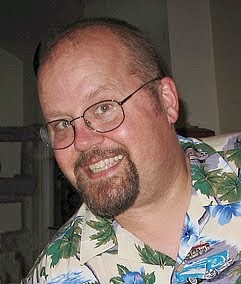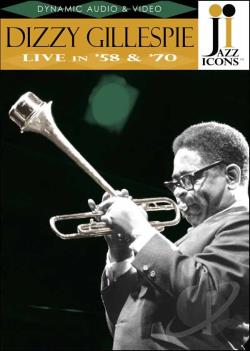After being mesmerized by the incomparable Ella Fitzgerald DVD in this same series, we returned to our local library to see if more musical treasures were waiting for us. In a funny role-reversal, even though the database said that the discs were available, I was having difficulty locating them. Then a former client from my video store turned the tables and helped me find the right section! The other three DVD’s in the Jazz Icons series were grouped together and we rented them all. We started with Dizzy Gillespie, and even though jazz is a genre of music I’ve yet to dive into, I was slowly and surely captivated by the immense creativity that I saw and heard.
Like the Ella Fitzgerald DVD, this disc also has two
concerts which are separated by enough time to see the evolution of the
performer. The first performance by
Dizzy was recorded in Belgium in 1958. All
the band members sport sharp tuxedos as one would expect from this era. While I was not familiar with any of the
songs, the depth of talent on the part of every performer was phenomenal. What I found most interesting was
that even though Dizzy Gillespie is clearly the front man, sax player Sonny
Stitt seems to get more solo time throughout the show. It was a magnanimous move on Dizzy’s part to
let his other band members have so much time in the spotlight, and it showed
how confident and humble Dizzy was. The
songs built on each other, each one more complex and chaotic than the last, while
never losing the textural thread of the particular piece. Sonny Stitt’s solos were amazing!
The second concert in Denmark in 1970 marks a radical change. Of course, over ten years have passed and
much social and political upheaval has occurred.
Dizzy has grown an afro to compliment his soul patch. The tuxedos have vanished, and each band member is now dressed in their own particular style.
The effect of the Love Generation on clothes is evident. While the
music is still very much the same in some ways, the effect of the times upon
Dizzy is so clear in the emotional tone of his performance. The second song, “The Brother K”, written for
Martin Luther King Jr., was when my first “moment” happened. I suddenly
felt the song filling me up as I was
awestruck at the intense outpouring of so
many deep and intense emotional chords.
King had been assassinated just two years before, and the fires of change born in the sixties youth culture were being slowly extinguished. The next generation inherited a pile of ashes, and the seventies became a decade thoroughly suffused with a bitter atmosphere of cynicism and regret. In “The Brother K”, Dizzy composes a beautiful yet heartbreaking distillation of so much promise unfulfilled and so much loss not yet acknowledged that it made my heart ache. Even though I had not lived in those times, he poured forth such a heady draught of pure emotion that blew me away with the gentle ferocity of his expression. I could feel the pain and the suffering of all those who struggled in those tumultuous times. It was time travel accomplished with music.
King had been assassinated just two years before, and the fires of change born in the sixties youth culture were being slowly extinguished. The next generation inherited a pile of ashes, and the seventies became a decade thoroughly suffused with a bitter atmosphere of cynicism and regret. In “The Brother K”, Dizzy composes a beautiful yet heartbreaking distillation of so much promise unfulfilled and so much loss not yet acknowledged that it made my heart ache. Even though I had not lived in those times, he poured forth such a heady draught of pure emotion that blew me away with the gentle ferocity of his expression. I could feel the pain and the suffering of all those who struggled in those tumultuous times. It was time travel accomplished with music.
The songs that followed built on this principle, and each
one brought me to another place. Some
felt familiar, some were lively and Latin, some were new and I was again amazed
at Dizzy’s ability to present so much emotional content with such an economy of
performance. The marked difference
between the two concerts is found not only in the dress and the relationship of the
band to the audience, but in the goal of the performances. In the first concert the
band is there purely to entertain. Much time had passed when the second concert was recorded, and Dizzy had grown so much that he had a new, more important
goal: to communicate.
Dizzy wanted the audience to feel what he felt, to take a journey with him through the past so that the future could be a better place. There was no stage separating the band from the crowd. In fact, Dizzy had a charming interaction with a parent with a small child, and the intimacy created in this moment would have been impossible with a barrier like a stage between them. Dizzy wanted to connect with his audience, and he did so in such an earnest and honorable fashion that I’ve now created a Pandora channel for him so that he can continue to speak to me.
Dizzy wanted the audience to feel what he felt, to take a journey with him through the past so that the future could be a better place. There was no stage separating the band from the crowd. In fact, Dizzy had a charming interaction with a parent with a small child, and the intimacy created in this moment would have been impossible with a barrier like a stage between them. Dizzy wanted to connect with his audience, and he did so in such an earnest and honorable fashion that I’ve now created a Pandora channel for him so that he can continue to speak to me.


No comments:
Post a Comment